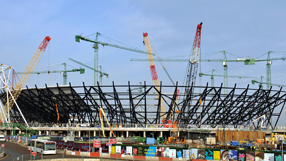2012 Olympic Stadium to house school after Games
LONDON - The 2012 Olympic Stadium will house a school rather than a Premier League club after the Games under legacy plans for the 500 million pounds ($740 million) venue, London Mayor Boris Johnson said on Tuesday.

"In the end there were insuperable obstacles with the shape of the stadium," he told reporters at the launch of a detailed masterplan for post-2012 which includes building 10,000 new homes and creating 10,000 jobs in east London.
"It would also have cost far, far more in the end to create a stadium suitable for Premier League football even if there had been a Premier League football team willing to come to the table. In the end there wasn't.
"And if you look back at our negotiations with West Ham United maybe we were lucky not to get too far down that track," he added.
West Ham, whose Icelandic owner has been hit hard by the global banking crisis, did initially express an interest in moving to the Olympic Stadium after the Games but were put off by the requirement to retain an athletics track.
Johnson said the idea of a lower league footall club or rugby club using the stadium had not been totally discounted. "If a club came forward with a coherent plan, of course we would consider it," he said.
When Johnson was elected last year he was critical of the lack of a blueprint for the legacy use of the 9.3 billion pounds Olympic Park and surrounding areas and appointed a board of advisers to maximise its use.
As well as a sport's academy for 400 secondary school pupils inside the stadium, there are plans for the English Institute of Sport and a National Skills Academy to be based there.
Get FourFourTwo Newsletter
The best features, fun and footballing quizzes, straight to your inbox every week.
Johnson said the stadium, which will be scaled down from it's 86,000 Olympic-capacity, will host international athletics events as well as other sporting events and concerts.
Olympic Minister Tessa Jowell said she hoped the Olympic Park project would become a "hub for sport in London" and act as "a magnet for business and investment".
